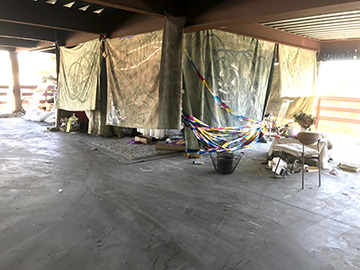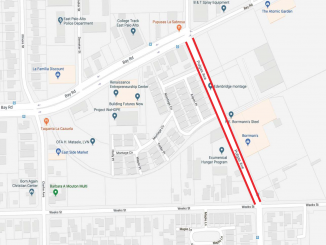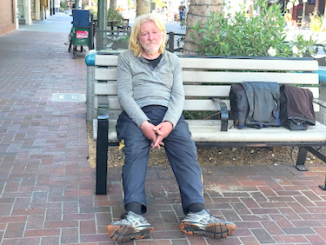
This story was first printed in the Daily Post on July 2. A follow-up story printed on July 9 appears below it.

BY DAVE PRICE
Daily Post Editor
Two homeless encampments have popped up on the upper floors of the Webster/Cowper Garage at 520 Webster Ave., just a block from University Avenue.
Such encampments aren’t unusual in other California cities, but they’re new in downtown Palo Alto.
Nobody was home yesterday, but tents, plug-in heaters, a Weber barbecue, a keyboard and a radio had been set up by the people living there.
The garage didn’t have many cars yesterday, and most of them were on the first two floors. So the upper floors provided plenty of room for residents to spread out.
Follow-up story printed July 9
Police try to help homeless with housing and services
BY DAVE PRICE
Daily Post Editor
The city has mostly dismantled an elaborate homeless encampment in Palo Alto’s Webster/Cowper parking structure, through there are two other tents on different levels of the garage.

Such encampments are common in San Francisco, Oakland and San Jose, but there aren’t many in Palo Alto. And when they pop up here, they get the attention of residents and the police.
Last Friday (July 2), the Post printed several photos of the homeless encampments in the garage at 520 Webster St., showing such things as a makeshift kitchen with a Weber barbecue.
On Saturday (July 3), police posted a notice that allows them to remove abandoned property within 48 hours. City Public Works employees helped clean up the encampment on Tuesday (July 6).
Assistant Palo Alto Police Chief Andrew Binder said yesterday (July 8) that officers are trying to solve problems with a compassionate approach that treats the campers as human beings.
“This has been an issue in Palo Alto for many years and we’re not going to solve it overnight,” Binder told the Post. “We’re going to get involved but we’re going to do our best to take non-punitive approaches.”

That means offering the homeless services ranging from mental health counseling to housing.
“One of the things that frustrates me is that not everybody wants help,” he said.
When police come across homeless encampments, police first go out and talk to the campers to see what services they need. Then police will put up a notice saying that in 48 hours the city will confiscate abandoned property.
Such a notice was posted by police at the garage on Saturday, Binder said.
When they begin dismantling a homeless encampment, city employees are faced with a question: “There is trash and debris and then there’s personal. It’s part of our job to figure out what’s what.”
“For our unhoused who are living there, that’s all they have. That’s their sense of worth, their belonging, what they own in this world,” Binder said. “That’s why (the approach we take) has got to be compassionate. And I think that’s what the community is looking for.”

He said the idea of arresting the homeless is low on the list of remedies for police.
“We could go in there and move everybody out of that garage and the next week they could be in another garage, or they could be in one of our parks, or they could come back,” Binder said.
“This isn’t something that gets solved in a day.”
One step in the direction of solving those problems is a new program that will put a mental health professional on the streets, paired with an officer, to help bring psychological services to people in need, and keep them from committing crimes that will put them in jail. The mental health professional will accompany officers when they visit places such as homeless encampments. The program, called Psychological Emergency Response Team or PERT, will be funded by Santa Clara County and Binder said he hopes it can start this fall.




This would be hilarious if it weren’t for the fact that it’s public property. If they want to camp in parking garage, they ought to pay the annual permit fee of $800 (or whatever it will be).